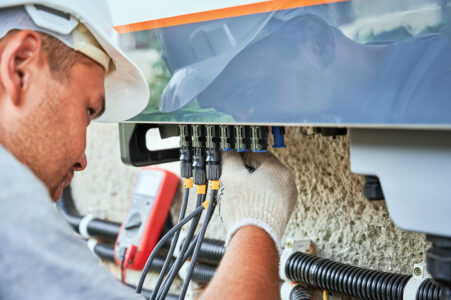Can the city condemn your property for not having a grid connection? Learn how to tell where it is legal to live off the grid before you build or cut the cord in this issue’s “Gone Off-Grid.”
If I go completely energy self-sufficient and fire the power company, can the city or county condemn my property for not having a grid connection? — Bill Underwood
You’d think we’d all have the option of living off the grid legally, but rules differ by location. Even in Texas, where I live (and where property rights are highly protected), the rules sometimes favor power companies and large cities. One day, a family living on their Texas ranch discovered survey flags dotting their pasture. The electric utility serving their area had planned for a high-voltage utility line to go through their property, altering their beautiful view and removing centuries-old oak trees, to serve a large city 50 miles away. The municipal power company had the authority through eminent-domain proceedings to claim right of way, subject to a negotiated price for the easement – and the power line was, in fact, built.
Where Is it Legal to Live Off the Grid?
Most solar and energy-storage installations where I live have restrictions for how they can be installed if you’re located inside the city limits, in a subdivision with a homeowners association, or both. This is the case elsewhere in the U.S. too. Because each city, county or parish, and state has its own rules, no single answer to your question exists. Here’s what I’ve discovered through research.
Let’s first discuss state rules regarding the legality of living off the grid. I’m not aware of property owners being prohibited at the state level from cutting the cord with their power companies.
Cities are another story. Most metro areas have mandatory electrical inspections and regulations restricting what you can install and how you can install it. City-owned power companies can require buildings to have a certificate of occupancy stating the structure is safe to be lived or worked in.
My Texas city – which, by the way, annexed my property – owns the utility company, and it doesn’t prohibit me from disconnecting electrical service. However, the city code gives the city inspector a lot of latitude in areas not explicit in the code, so the inspector might take exception to an off-grid electric system. An entity considered to be the “authority having jurisdiction,” such as your city government, uses the National Electrical Code but has the ability to add to or subtract from the code’s provisions. If an inspector decides your home is unsafe or presents a fire hazard – and those conditions can be caused by a solar system and batteries – the inspector can red tag your electrical system. Per city code, the condition must be repaired or the city has the right to condemn your property.
So where is it legal to live off the grid? Before you build an off-grid home or cut the cord to an existing one, find out which authority has jurisdiction over your property. Then, meet with its team and find out what you can and can’t do. Get an answer in writing, which might even be in the form of an approved permit. Finally, you may wish to consult an experienced real-estate attorney for your area to resolve any issues.
Note: Readers are cautioned to seek advice from solar or energy-storage experts. The information presented here can’t replace professional legal, accounting, or engineering services.
Send Us Your Power-Full Questions
We’ll do our best to answer your questions on energy subjects in upcoming issues. Email them to Letters@MotherEarthNews.com with “Energy Q&A” in the subject line.
May all your days be filled with sunshine — even when it rains!
Hoss Boyd is founder, president, and CEO of TeraVolt Energy and a recognized solar and energy-storage expert.
Originally published as “Gone Off-Grid” in the April/May 2024 issue of MOTHER EARTH NEWS magazine and regularly vetted for accuracy.




